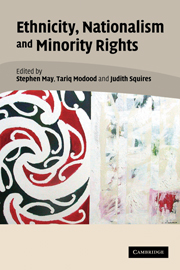Book contents
- Frontmatter
- Contents
- Preface
- List of contributors
- 1 Ethnicity, nationalism, and minority rights: charting the disciplinary debates
- Part I Ethnicity and ethnic groups
- Part II The state and minority claims
- 6 New nationalisms and collective rights: the case of South Asia
- 7 Justice and security in the accommodation of minority nationalism
- 8 Two concepts of self-determination
- Part III New directions
- Index
- References
6 - New nationalisms and collective rights: the case of South Asia
Published online by Cambridge University Press: 22 September 2009
- Frontmatter
- Contents
- Preface
- List of contributors
- 1 Ethnicity, nationalism, and minority rights: charting the disciplinary debates
- Part I Ethnicity and ethnic groups
- Part II The state and minority claims
- 6 New nationalisms and collective rights: the case of South Asia
- 7 Justice and security in the accommodation of minority nationalism
- 8 Two concepts of self-determination
- Part III New directions
- Index
- References
Summary
Two historical moments, and conceptualizations anchored to them, gave birth to much of the current confusion around the issue of nationalism and collective rights. The Treaty of Westphalia, concluded in 1648, initiated the notion of the nation-state which ineluctably linked nation and state. But the state is inherently uncomfortable with the idea of cultural diversity and it is prone to count and label citizens; the lesser the number of social categories the more comfortable the state is. In order to be comprehended by the state the sociocultural world had to be standardized and simplified; the idea of “uniform, homogeneous citizenship” had to be created (Scott 1998: 32). Consequently, the single most important project of nation-state was, and continues to be, homogenization.
In this respect, the state's tendency to homogenize minorities is particularly evident. Native Americans, an aggregation of over 250 First Nations, and “Asian Americans,” a wide variety of peoples drawn from the two civilizations of China and India present in the United States of America, are but two examples. Similarly, the Scheduled Tribes is a common label for over 400 First Nations of India, and Scheduled Castes is an aggregation of numerous caste groups drawn from over a dozen “nations” of India. In contrast, the distinctiveness of the collectivity is not eroded in the case of dominant groups, as exemplified in the case of White Anglo-Saxon Protestants or Brahmins.
- Type
- Chapter
- Information
- Ethnicity, Nationalism, and Minority Rights , pp. 121 - 143Publisher: Cambridge University PressPrint publication year: 2004
References
- 2
- Cited by



